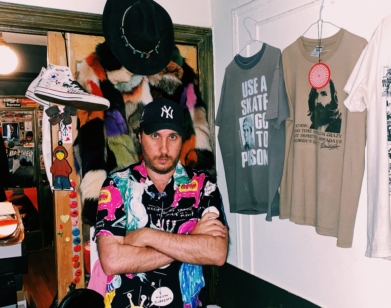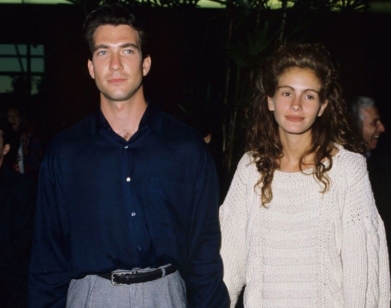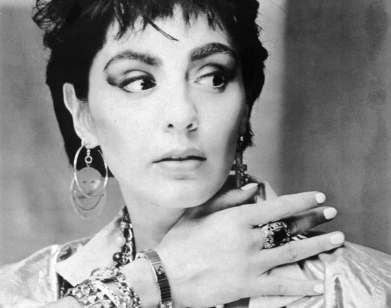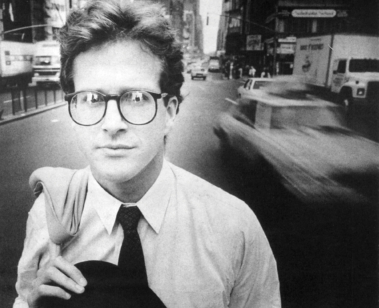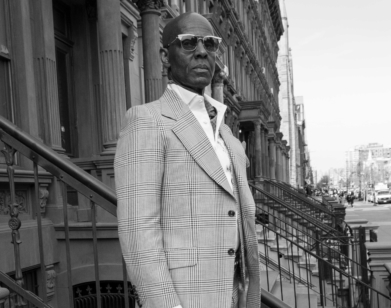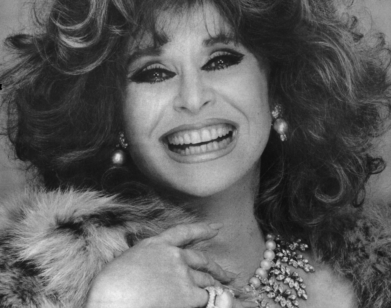Dennis Hopper talks ditching Hollywood for drugs and painting in New Mexico

DENNIS HOPPER PHOTOGRAPHED AT HIS VENICE BEACH, CALIFORNIA HOME BY EUGENE PINKOWSKI. CAMERA: MAMIYA. PRINT: PHOTO IMPACT, L.A.
The morning I was to meet Dennis Hopper at his studio home in Venice Beach, he was scheduled to appear on a news interview commemorating the anniversary of the death of James Dean. This association of the 49-year-old actor with the era of tough guys past has followed him since his appearances in Giant and Rebel Without a Cause, and was reinforced by the phenomenal success of Easy Rider (1969), which he co-authored (with Peter Fonda and Terry Southern) and directed. Though Hopper has appeared in a number of fine movies since that time, most notably Apocalypse Now (1979), the ’70s were mostly a dropout period for the Kansas-born actor. Living in Taos, New Mexico, he spent his time collecting art, taking photographs and nurturing and infatuation with drugs and alcohol, which he kicked a year ago. Now back in Los Angeles, Hopper is clearly in a new phase of life, re-entering the public eye with Dino de Laurentiis’ Blue Velvet, in which he co-stars with Isabella Rossellini.
Driving through a six-block area of devastating ghetto—a war zone full of abandoned automobiles, wrecked furniture, broken-down sheds, trash-littered sidewalks and graffiti on top of graffiti—I finally arrived in an alley at the rear of a three-house complex built by architect Frank Gehry. Once owned by artists Charles Arnoldi, Laddie John Dill and ex-lifeguard/writer Bill Norton, the house has now been redesigned by avant-garde architect Brian Murphy and filled by Hopper with conversation pieces. “Have you locked your car? It’s not safe out there,” said my host before excusing himself to brush his teeth. Around the room are several haunting life-size Día de Los Muertos figures brought in Mexico. The closet is lined with Hopper’s own black-and-white photos of artists Robert Irwin, Edward Kienholz, Claes Oldenburg, Wallace Terman, Jasper Johns, Billy Al Bengston, Ron Davis and Llyn Foulkes. Though Hopper’s three divorces—from Brooke Hayward, Michelle Phillips (that marriage lasted seven days) and Daria Halprin—have left him practically artless, he’s slowly rebuilding his collection with the works of Ronald Cooper, Laddie John Dill and George Herms.
JOAN QUINN: You recently said that in the 1960s, free love and taking drugs created a sort of common bond; it was like a dream where we all held hands, took acid and looked for God. Did you ever find Him?
DENNIS HOPPER: Did I ever find God? God found me.
JQ: Is that why you’re here now?
DH: You got it. I was planning to leave myself out in the desert somewhere dead, and God said, “Come on in. Why don’t you come back and see some of your friends? They’re dead too.”
JQ: How did you get started in your career?
DH: Well, I was born in Dodge City, Kansas, and my mother ran a swimming pool there.
JQ: Were you a great swimmer?
DH: Yeah, I was pretty good. I was a pretty good athlete. I don’t really do much of that anymore except for going to the gym. When my father came back from the war, I was about nine years old, and we moved to Kansas City, Missouri. From there we moved to San Diego, where I went to high school. My career started at the local theater in San Diego; I started acting when I was thirteen.
JQ: You have a strong stage background.
DH: Yeah. I was playing Shakespeare and John Swift saw me. Through a letter from John Swift I got a small part on TV in Cavalcade of America. Then I read for another part, which I got, and seven studios called me up to put me under contract. The first one I went to was Columba Pictures. At Columbia, Barry Cohen said, “You’re the most naturalistic actor I’ve ever seen, but we’ve got to send you to school and take all that Shakespeare out of you.” And I told him to fuck himself, and with that I was banned from the studio. Columbia, 1955. I never worked at Columbia Pictures until I came back in off the road with Easy Rider. And I edited Easy Rider at Columbia as well.
JQ: So you were blacklisted—
DH: Columbia was the first time. Then I went under contract with Warner Brothers, until I had a falling-out with Henry Hathaway.
JQ: Why were you having all this trouble?
DH: I was temperamental. I figured I knew a hell of a lot more about acting than they did at that time, which probably was true.
JQ: Would you say your real lead into everything, your first jump, was Rebel Without a Cause, or was it Giant?
DH: Well, Giant, because Giant was a major part. I had this sort of simmery material in Rebel, one of the gang members. In Giant I had a part.
JQ: What about your relationship with James Dean? I know it’s probably been over-talked about, but…
DH: He died September 30.
JQ: Did you ever have any kind of special relationship with him?
DH: He only made three movies, and I was in two of them, the last two.
JQ: He was older than you.
DH: Yeah, he was. I was 18; he was about 24 when he died. It’s strange, he was one of the oldest people in the movie. He was older than Elizabeth Taylor, which is hard to believe.
JQ: What about your relationship with Natalie Wood? She was in Rebel.
DH: Yes, Natalie and I went together off and on for years. We were pretty wild. Natalie and I starred in a couple of television shows together, like King’s Row. And then we starred in a Kaiser Aluminum Hour in New York. George Roy Hill directed that, just before Giant premiered. I went to the premiere of Giant, and the studio wanted me to take Natalie, and I wanted to take Joanne Woodward, and nobody had ever heard of Joanne Woodward, and I insisted. So when I arrived at the premiere of Giant, they wouldn’t interview me because I was with Joanne Woodward, and they said, “Who are you, his secretary?”
JQ: It was all controlled by the studio?
DH: It’s always controlled by the studio. Afterward we went to the Copacabana, where Jack Warner had his own table, and Mike Todd kept sending me for Elizabeth Taylor, to get her out of the bathroom. He said, “You’re younger, you can go yelling back there; if I do that…Go see what she’s doing in there.” Joanne said she wanted to leave, and so I said, “Okay, I’ll take you home.” I brought her up the stairs and tried to get into her apartment, but she wouldn’t let me in, and finally she pushed me down a flight of stairs. I never figured that out, until she told me that Paul [Newman] was waiting for her in her apartment. This was before they were married.
JQ: What about Elizabeth Taylor? What was she doing in the bathroom all that time?
DH: I have no idea, but Mike Todd was really mad.
JQ: Who were the women in your life?
DH: I don’t know, but I was very active. I got married to Brooke Hayward in ’61, so I wasn’t married till I was 25 years ago.
JQ: What women come to mind?
DH: Besides Natalie Wood? Joan Collins, Ursula Andress…
JQ: Did you have serious affairs with these women?
DH: What’s serious?
JQ: Whatever was serious then.
DH: There wasn’t too much serious to me in those days. Let’s see, God, I don’t think there was a starlet around that could have been had in those days that I didn’t have.
JQ: And now?
DH: I don’t have anything serious in my life at the moment except work. But probably if I analyzed it, that’s all I’ve ever really had.
JQ: How could you leave Hollywood after this kind of exciting existence, and just go off to Taos [New Mexico]?
DH: At the time it seemed the right thing to do. I had made Easy Rider, and I could afford to move to Taos. I had just shot The Last Movie and I needed a place to edit it. I wanted to edit it in Taos, so I bought the Mabel Dodge-Luhan house, which had thirteen bedrooms with separate entrances, and so it was easy for me to edit in. And I bought a little movie theater there, and I put sync sound in it so I could see what I was cutting, on the screen, while I was cutting it. It just seemed that that was the place I wanted to be at the time.
JQ: How did you get your role in Apocalypse Now?
DH: I have an agent, you know.
JQ: But were you rejecting things most of the time?
DH: No, I worked almost constantly.
JQ: I had this feeling you were exiled.
DH: I did a lot of films in Europe, in Spain. I went to Australia and did Mad Dog Morgan; I did Apocalypse Now in the Philippines; I did Wim Wenders’ film The American Friend in Germany. I worked with Bianca Jagger and Veruschka in Brussels; I worked in England; I worked in Sweden…
JQ: You have been credited with having a great eye, with or without drugs, or alcohol, because you’ve assembled over the years one of the great art collections.
DH: When some people were going around being surf bums and tennis bums, I was being a gallery bum. I really liked galleries. For example, when I first saw Ed Kienholz’ work it disturbed me, and I hated it. I went out pissed off, and I thought, well, wait a second, let me go back and see what might bother me and see if it’s really good work. I ended up loving Kienholz’ work. But, like, I always go back. If something bothers me I go back and search it out. The first time I saw Jackson Pollock it disturbed me, man, I wasn’t pleased with what I saw. I didn’t understand it. I got to understand it very quickly, quicker than other people.
JQ: But did you feel you wanted to be an artist?
DH: I painted from the time I was five years old. I was going to be a painter, an actor, a director, and a writer.
JQ: And a photographer.
DH: That’s what you should do if you have no education. I mean, I could always play baseball, but I happily figured that game might run out.
JQ: Are you collecting again? From what I understand, half of your collection went to Brooke.
DH: Half? I think all of my collection went to Brooke. Brooke had no paintings before I met her.
JQ: And then you lost a lot in a fire.
DH: Well, I lost my own paintings. But Brooke lost all of her mother’s things, all of her mother’s furniture, and in a strange way that started us on a whole new thing. But I lost more than 200 canvases of my own. I started to paint again but I couldn’t paint anymore. I started assembling objects with photographs, large photographs and objects, sort of making plastic and shoes and stuff. Then I stopped that in 1965, when I had a one-man show at the Hazlitt. I didn’t make anything until two years ago, when I started painting again.
JQ: You also had a show in 1970, organized by Henry Hopkins, with Rauschenberg and your photographs.
DH: The very night of the fire I was having a photographic show, so all my photographs and negatives were saved. Yeah, I had a show of the ’60s, a “Decade of Photographs.”
JQ: There was a period when you were very close to William Burroughs. Do you have any anecdotes?
DH: Yeah, well I made a deal with Jock Stern to do a movie of Junkie, William Burroughs’ first novel, which he put out under a pseudonym and then re-released under his own name years later. Anyway Stern wanted to make a movie of it, so I got him to give Burroughs $45,000, Terry Southern $45,000, and me $45,000 to write a screenplay that I would direct. And so I wrote about three screenplays, Terry about six, Burroughs about five. There was a year that we were together in new York, in the late ’70s. I got to spend a lot of time with Bill; he’s an incredible man.
JQ: What happened to the movie?
DH: It was never made. I did a lot of experimentation with heroin at that time.
JQ: You’ve been involved in MTV and video.
DH: Yeah. So far it’s been a live dialog and nothing’s happened. I did a video with Mick Jagger down in Rio de Janeiro. But I played a video director, and that’s the closest I’ve gotten to directing, except Bob Dylan came and had a few meetings with me about doing a video for him. I wanted to do it very badly, but he went off and did it with somebody else. And Phil Spector, who’s going back into producing, wants me to head up his video department.
JQ: How do you feel about it?
DH: I think it’s great, man.
JQ: Where do you spend most of your time now?
DH: In bed as much as possible. I try to stay in the neighborhood as much as possible. I never thought I’d ever come back to Los Angeles; I’m having a great romance with Los Angeles, and I’m having a great romance with my sobriety.

